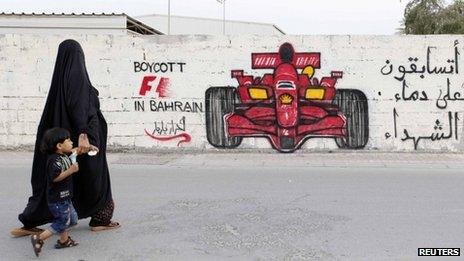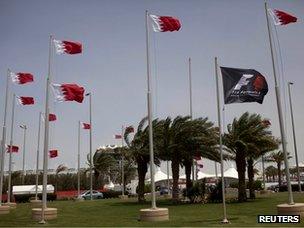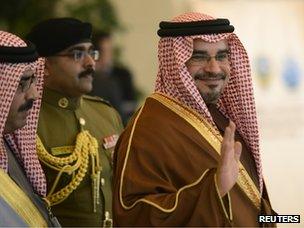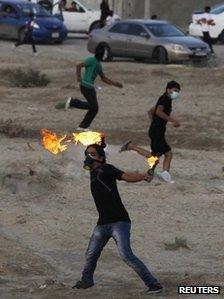Bahrain GP: The BBC explains the background to the protests
- Published

Unrest on the island forced the cancellation of the 2011 Bahrain Grand Prix
As Formula 1 returns to Bahrain this week, protesters in the tiny Gulf state have once again threatened to disrupt the annual Grand Prix. But who is protesting and why?
Dwarfed by its mainland neighbour Saudi Arabia, the Kingdom of Bahrain, made up of 33 islands in the Persian Gulf, has experienced unrest and rioting on an almost daily basis for more than two years.
The problems began when the country was caught up in the Arab Spring, a revolutionary wave of demonstrations and civil wars in the Arab world, at the start of 2011.
Protests broke out in the Bahraini capital of Manama on 14 February 2011, when campaigners occupied an iconic landmark, the Pearl Roundabout. They wanted reform and democracy in a country that has been ruled by the royal al-Khalifa family for more than 200 years.
Many, but not all of the protesters, were Shia Muslims, who make up the majority of the population in Bahrain.
Like Christianity's two main branches of Catholicism and Protestantism, Islam is divided into two main broad interpretations: Shia and Sunni.
There are approximately 600,000 Bahrainis, with Shia making up roughly 60% of that number. A large expatriate community takes the total population to more than a million. The al-Khalifas, like the vast majority of their fellow Arabs in the Middle East, are Sunni Muslim.
Unhappy majority
For decades, Shia Bahrainis have complained of discrimination, high unemployment and inadequate housing in a country that first grew rich on oil discovered in 1931.

Preparations for the Grand Prix are well under way at the Bahrain International Circuit
In the 1990s, there was a widespread crackdown. Shia religious leaders, opposition political figures and human rights activists faced arbitrary arrest and abuse in detention. Forty people died as dissent was crushed.
The situation in the country improved dramatically when a new king came to power in 1999 with a promise of reform.
King Hamad presided over parliamentary elections, the relaxation of press restrictions and economic reforms that gave human rights activists and the Shia majority new optimism.
It was in that climate of hope that Bahrain secured a coveted place on the Formula 1 calendar. The first race,, external which took place at the £94m Bahrain International Circuit at Sakhir in 2004, was a huge success.
Embraced by nearly all Bahrainis, the event passed off smoothly for several years.
Prince with a vision
F1 in Bahrain was the brainchild of the King's son, Crown Prince Salman bin Hamad al-Khalifa.

Crown Prince Salman was responsible for bringing F1 to Bahrain
Regarded by many as a moderniser and a reformer, he saw the potential of an international event that would introduce the country to a huge global audience.
Together with its other reforms, Bahrain positioned itself as a progressive Gulf state, open to the West and its influences. F1 proved a brilliant platform to convey that message. The country and the race flourished.
But the smooth ride hit the buffers in 2011, when unrest in the island kingdom forced the postponement and then the cancellation of the Grand Prix.
The occupation of Pearl Roundabout was a peaceful affair that soon turned bloody. The roundabout was forcibly cleared, leaving three dead and hundreds wounded.
The government found itself on the back foot as peaceful demonstrations continued and the roundabout was re-occupied.
Pearl Roundabout was finally cleared when troops from Saudi Arabia and other Gulf Co-operation Council (GCC) states entered the kingdom in March 2011 in what was a moment of humiliation for the Khalifa family.
A cancelled race
In the months that followed the GCC intervention and the race cancellation, more than 50 people died, including five security officers.
Hundreds of people were arrested, scores were tortured in jail and convicted in front of military tribunals, while more than 4,000 people were summarily sacked from their jobs, including 29 employees at the Sakhir track.
The vast majority of those affected, including all of the BIC employees, were Shia.
An international outcry led to King Hamad appointing a panel of human rights experts to investigate the events of February and March 2011.
Headed by an Egyptian, Cherif Bassiouni, the Bahrain Independent Commission of Inquiry (BICI) report, external was a scathing indictment of his government, but King Hamad accepted the findings and promised sweeping reforms.
The government says that, as proof of its commitment to reform, the legal and law enforcement systems have been overhauled, employees who were unfairly dismissed have been reinstated, and a special prosecution unit set up to investigate abuse claims.

Thousands regularly turn out to protest in Shia villages around the capital
But critics say that, since the report was released, little has changed. They point to the political prisoners still in jail, to ongoing arrests, to what they say are extra-judicial beatings of young protesters, and to the heavy use of tear gas.
Last year's race did go ahead but in an atmosphere of heightened security and ongoing tension far removed from the celebratory mood that F1 and Bahrain had enjoyed before the 2011 uprising.
And four mechanics from the Force India team were caught up briefly in a confrontation on a main highway between youths hurling Molotov cocktails and police responding with tear gas.
No Force India staff were hurt but two team members subsequently asked to return home.
Car blast rocks capital
The government has sought to reassure F1 fans and the international community that this year's race is safe.
At a media conference, Samira Rajab, Bahrain's Information Affairs minister, described the situation in Bahrain as "very reassuring" and blamed foreign media for "blowing the security (aspect) out of proportion".
"There has been no major escalation of violence on the ground recently as the F1 Bahrain Grand Prix is drawing nearer," the minister said.
However a car blast in the heart of Manama a few hours later was a clear indication that, despite the reassurances, all is not well in Bahrain.
A shadowy protest group that calls itself the February 14 movement took credit for the explosion.
As the unrest drags on with little progress being made, angry youths from Shia villages continue their daily barrage of Molotov cocktails, burning tyre roadblocks and running battles with the police.
The response of the authorities has sometimes been scarcely less violent, with police opening up at close range with birdshot and high levels of tear gas on both peaceful and violent protesters.
Because Bahrain is a tiny place and most of its inhabitants live in an area that is not much larger than London and its suburbs, everyone is affected by the ongoing unrest one way or another.
More than a race
Unlike any of the other F1 venues, Bahrain finds itself stuck in a political quagmire with no easy way out. F1 organisers would no doubt be delighted if the political controversy around the event died down.
But F1 in Bahrain has come to represent much more than a grand prix.
Ironically, it is F1's global stature that has guaranteed that the race, unlike any other sporting events held in Bahrain, has become a strategic symbol for both sides.
For the government and its supporters, holding an F1 race demonstrates that the kingdom is stable and back on track. For the opposition, the race is little more than an attempt to conceal what they say is the ugly truth of daily life in the country.
For ordinary Bahrainis and members of the large expat community, F1 is a way of putting aside, at least for a few days, the roads blocked by burning tyres, the police checkpoints and the whiff of tear gas in the air.
But, with Sunday's explosion, walls being daubed with anti-F1 slogans, and protesters promising further disruption, that may prove hard to do.
- Published15 April 2013